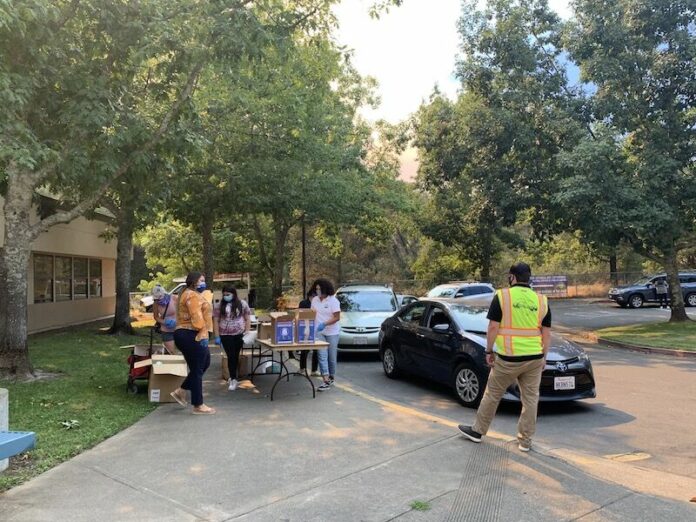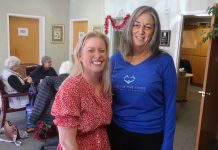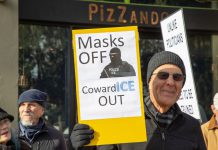
For a few weeks, Corazón Healdsburg CEO Glaydon de Freitas has been worried for his staff and clients regarding questioning around Corazón’s mission and values. Public comments have been made criticizing the nonprofit’s pro-vaccination stance. De Freitas said emails have been sent to the organization and people have shown up at the Corazón office because of the same reason.
“I just think that it disturbs our operations and doesn’t contribute to the work that we are doing. It’s very important that the community knows that Corazón is pro-vaccination. We have been receiving some text messages, some emails with hatred content questioning Corazón’s mission and questioning our commitment with equity and diversity,” he said.
At a recent Healdsburg City Council meeting, a public commenter used Councilmember Ariel Kelley’s affiliation with Corazón Healdsburg to question both the organization’s mission, as well as Kelley’s stance on equity and equality. Kelley co-founded Corazón and served as its interim CEO before de Freitas was hired. De Freitas said, as the Healdsburg City Council continues to be questioned regarding the council’s policy to only allow vaccinated individuals to attend council meetings in-person, more people have questioned the nonprofit’s mission and stance on vaccination.
“According to their website, they are a mission-driven human rights organization that believes in human dignity and human rights. As Aristotle has been telling us for more than 2,000 years, justice is only achieved when we have equality. According to him, there’s nothing so unequal as the equal treatment of unequals. People should be treated equitably and ethically, given their individual needs and circumstances and the differences between people should be recognized and valued, not diminished. Our community is not demanding too much,” said Adina Flores when commenting on the Healdsburg City Council’s rule that only vaccinated individuals can attend council meetings in person. “We just want a compassionate and just community. Based on this inevitably contradictory mission statement, I’d like to inquire why your incredible council member Skylar Palacios, an Afro Latino woman has been denied entrance to the council chambers.”
“Despite this attempt to discredit our commitment to the community, we remain firm in our belief that our support of the vaccine is fully aligned with our work to empower and dignify individuals and families,” reads a statement from Corazón, released in response to questioning of the organization.
De Freitas said since the beginning of the pandemic, Corazón stepped up to help the most impacted by the pandemic, with one of the most vulnerable populations being the Latin American community in Healdsburg.
“When the vaccine became available to the public, the first thing that the county decided was to release the way that the vaccine would be rolled out and the way that the vaccine would be offered, then we went to the policy and we saw there were barriers back then,” he said.
“Language, technology, even scheduling the time of the vaccines, or at what time the vaccines will be available, all of those things together would impede the Latin American community to get vaccinated,” de Freitas said.
Corazón made partnerships with Alliance Medical Center and de Freitas said Kelley helped Corazón receive funds and helped coordinate with people to create a plan of action to support the Latin American community.
“What we did was we brought 40 volunteers and created a call center. We started calling from different lists from Corazón, from Alliance, from everybody. We conducted conversations with doctors and medical specialists about vaccines and bringing awareness,” he said.
De Freitas stressed people were not being obligated to get vaccinated but were given the opportunity. When there was some hesitancy, the hesitancy was never questioning the science but questioning if their immigration status would be putting them or their families in danger.
“‘What if my name is going to go to ICE.’ What about my immigration status? Oh, the question was about the hesitancy also, I cannot get the vaccine because of work tomorrow, I will miss my workday because if I have some side effects, their hesitancy was rarely because of any other reason,” de Freitas said.
“We had our phones ringing off the hook of people wanting the vaccine, mostly Spanish speakers wanting the vaccine and saying, ‘I don’t know what I’m supposed to do,’” Kelley said.
“We weren’t approaching it from a place of, ‘We have decided that you must get vaccinated’” Kelley said.
According to the statement from Corazón, the organization has 27 employees — 24 are Latin American, Black, Indigenous or people of color and 100% are fully vaccinated.
“Our employees have suffered from this pandemic, with schools closed for months, lost wages for spouses and dear family members lost to this deadly virus, including overseas where vaccines have not been as readily available as they are here in the U.S. Corazón does not purport to represent the Latin American community. Instead, the organization exists as a vehicle to elevate and amplify the voices and aspirations of those who would otherwise be ignored. Our community has said loud and clear that they want the COVID-19 vaccines and Corazón will continue to make sure they are available to everyone,” the statement reads.
The reason behind his belief about the efficacy of the vaccine is based on data and personal experience.
“I myself lost three family members back then in Brazil, and they died because of COVID because Brazil did not distribute the vaccines in an equitable way. In 45 days, three family members of mine died. I am not capable as an individual organization, to dedicate the time of the organization to analyze research that’s there, these agencies are there for it,” he said.
“So, we trust (the Food and Drug Administration), we trust (the Centers for Disease Control and Prevention). We trust all this worldwide authority to let us know what vaccination is safe, what vaccine is not safe,” De Freitas said.
Because of recent criticism of their equitable commitment to the community, de Freitas said it is not fair to the work the organization demonstrates constantly.
“It was a direct attack on Corazón’s efforts; this is not fair for Corazón. This is not fair for the community that trusted the system and got vaccinated in every single moment, the first shot, the second shot and now the boosters. It’s not fair for the hundreds of thousands of dollars and time that is spent from us, from our volunteers in this community engagement moment to have our families vaccinated,” he said.
“We hear, we listen to that every single day from our community members. We don’t have the arrogance to represent a community, but we are rather a vehicle for the community to have access to resources and to elevate their voice,” he said.
De Freitas also became concerned in how the questioning of Corazón could affect future funding or donations.
Kelley said she saw firsthand the disproportionate impact on communities of color of essential workers of people who did not have the luxury of working from home when the state shut down when COVID-19 arrived in the U.S. Because of what she saw and experienced, her stance on vaccination and decision on requiring vaccination to attend a council meeting remains, attributing it to public safety.
“It’s not just numbers on data — it’s like real people, real problems and like, really right here,” she said.
When it comes to what she thinks of the vaccine, Kelley said she believes it is saving lives.
“I’m not a scientist. I’m not a doctor. But I respect people who have worked their entire lives, developing scientifically tested and proven things that I trust that are effective,” she said.
However, Kelley added she understands why people would not want to get vaccinated because of a mistrust of the health care system.
“I also think that there are people who are arriving at this decision of whether or not to be vaccinated based on an experience that is different from mine, and an experience that might be different than many people in this community. What I’m specifically referring to is people’s lived experiences with mistrust of the health care system — rooted in historic racism, rooted in historic trauma — about medical experiments that were done to people without their knowledge,” she said.
“I think that a lot of that trauma is a part of the conversation. That’s what I think should happen and needs to happen as we talk about why people don’t trust the healthcare system or not trust the government, they don’t always assume it has their best intentions,” Kelley said.
Though she understands an individual choice, Kelley added vaccination impacts the community and it stops being an individual decision.
“An individual’s choice, to me, is OK. But there is this place of when your individual decision impacts others and impacts the broader community. That is where I think that is the challenging place that we find ourselves at. These are not individual choices, because we’re in a public health crisis,” she said.
When it comes to recent criticism of Corazón’s mission, Kelley said people who wonder about their motives should ask the community instead of staff.
“I can’t really speak in an unbiased way about an organization that I deeply believe in the track record of work and how effective they’ve been in the community. But I would say, don’t ask the staff, ask clients, ask the people they’ve helped,” she said.








